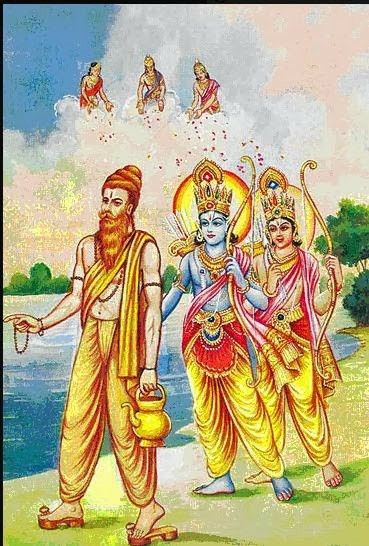[64] महायोगी
ॐ महायोगिने नमः
।Om Mahayogine Namah।
The Great Yogi

-
कौसल्या सुप्रजा राम पूर्वा संध्या प्रवर्तते |
उत्तिष्ठ नर शार्दूल कर्तव्यम् दैवमाह्निकम् || १-२३-२
2. kausalya su praajaa = Kausalya, the lucky, begetter [Kausalya is fortunate because she begot you, such as you are]; raama = oh, Rama; puurva sandhya = eastern, aurora; pra vartate = verily, emerging; uttiSTha = get up; nara shaarduula = man, the tiger; daivam = to gods; aahnikam = daytime tasks; kartavyam = is to be performed.
"Fortunate is Kausalya to beget you as her son Rama... get up oh, tigerly-man, eastern aurora is emerging, daytime tasks towards gods are to be performed." [1-23-2]
This is another celebrated verse chanted even today. So far Rama is a dear prince to his parents. But here, no less than Sage Vishvamitra said to have deified Rama in asking him to 'get up' from divine trance to undertake the human duties to eliminate evil, like the dawn of the sun eliminating the evil darkness. In other ancient manuscripts the same verse obtains as:
kausalyaa maataruttiShTa puurvaa sandhyaa upaasyataam |
paurva aahNikam vidhim kartum taata kaalo'yam aagataH ||
This early morning 'awakening' of Vishnu or his incarnates from divine trance is a common practice in Vaishnavaite tradition, and is followed even today, called suprabhaata seva , morning service to wake up.
At the rising of the sun as well as at noon certain observances, invocations, and prayers were prescribed which might under no circumstances be omitted. One of these observances was the recitation of the sAvitri, [Gayatri, so to say,] a Vedic hymn to the Sun of wonderful beauty - Gorresio.
For kausalyaa su prajaa raama Griffith says: 'High fate is hers who calls thee son: / Arise, 'tis break of day /. And Gita Press has it as: Kausalya is blessed with a worthy son [in you.]
तस्य ऋषेः परम उदारम् वचः श्रुत्वा नृप नरोत्तमौ |
स्नात्वा कृत उदकौ वीरौ जेपतुः परमम् जपम् || १-२३-३
3. viirau = valorous ones; nara uttamau = among people, best - Rama Lakshmana; tasya R^iSeH = that, sage's; parama udaaram vachaH = very, benign, words; shrutvaa= on listening; they got up snaatwaa = bathed; kR^ita udakau = having performed, water oblation; paramam japam jepatuH = supreme, hymn, meditated upon.
On hearing the benign words of the sage those valorous and best ones among men got up, bathed, and on offering water oblation they mediated upon the supreme hymn, namely Gayatri. [1-23-3]
Rama and Lakshmana meditated upon Gayatri hymn as there is no hymn superior to it; na gaayatryaaH param japyam and this is also the usual hymn for water oblation at dawn or dusk: sandhyaa vandana . sandhya is the time between the day and night when the stars or the sun are not visible. aho raatrasya yaH sandhiH suurya nakShatra varjitaH Then this hymn is to be meditated placing her in ones own heart or amid the solar system. gaayatriim sam smaret dhiimaan hR^idi vaa suurya maNDale.
कृत आह्निकौ महावीर्यौ विश्वामित्रम् तपोधनम् |
अभिवाद्य अति संहृष्टौ गमनाय अभितस्थतुः || १-२३-४
4. mahaa viirau = great, stalwarts; kR^ita aahnikau = after performing, duties of dawn; ati samhR^iSTau = very, enthusiastically; vishvamitram tapaH dhanam = to Vishvamitra, whose ascesis, is his wealth; abhivaadya = venerated; gamanaaya abhita sthatuH = to travel, they presented themselves [before the sage.]
On performing their dawn time duties those two stalwarts, Rama and Lakshmana, enthusiastically presented themselves before the ascetically rich sage Vishvamitra for further journey, duly venerating him. [1-23-4]
Bạn đang đọc truyện trên: AzTruyen.Top